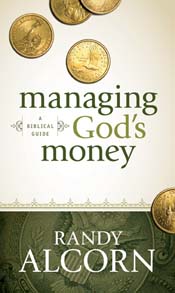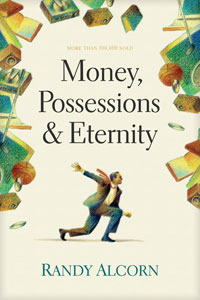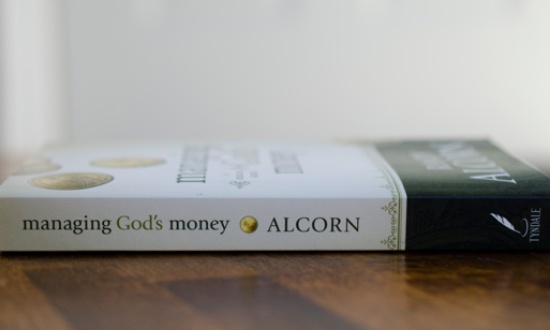Considering everything else God could have told us that we really want to know, why did He say more about how we are to view and handle money and possessions than about nearly any other single thing? It’s because the everyday choices we make regarding money and possessions—which affect nearly everything we do—are of eternal consequence.
There are two equally incorrect beliefs about money: 1) that it’s always evil, and 2) that it’s always good. Both views have an advantage shared by all unbalanced positions—they require no discernment. Unfortunately, they both result in excesses that undermine, rather than further Kingdom purposes.
Christian compassion can accomplish great good through giving to alleviate suffering. Money can be used to feed, clothe, and provide shelter. It can fund the translation and printing of Bibles, provide for missionaries, or build houses of worship. In this sense, money appears to be good. But it’s really the giver who’s doing good. People may be moral or immoral, but things are morally neutral. Money can be an instrument of good, but it’s not intrinsically good.
Likewise, money can be used to buy a slave or a whip to use on a slave. Money can buy cocaine, and fund terrorist acts. But in each case the evil resides in people, not money, just as in other cases the good resides in people, not money. Fire is a gift of God which, when misused, brings destruction and death. So money has potential to be used for either good or evil.
If this were a morally neutral world, we would expect money to be used in a morally neutral way. But the world is not neutral; it’s sinful and under a curse (Romans 8:20-22). In the hands of sinful people, money becomes an idol, a false god. In rejecting a God they don’t wish to serve, sinful people instead serve—and serve themselves with—money.
Although there’s nothing inherently wrong with money, there’s something wrong with devotion to money. “People who want to get rich fall into temptation and a trap and into many foolish and harmful desires that plunge men into ruin and destruction. For the love of money is a root of all kinds of evil” (1 Timothy 6:9-10).
Far too many evangelical Christians have fallen into that trap. They believe the lie that their money and possessions are theirs to do with as they please. Never have so many thought that as long as they affirm with their lips a certain doctrinal statement, they may live their lives indifferent to human need and God’s command. But without a balanced, God-directed view of money and how to use it, we miss God’s blessing and incur His wrath.
 Ownership vs. Stewardship
Ownership vs. Stewardship
God doesn’t just own the universe. He owns you and me. Stewardship is living with the awareness that we are managers, not owners; that we are caretakers of God’s assets. How we handle money and possessions demonstrates who we really believe is our true owner—God or ourselves. God says, “You are not your own; you were bought at a price” (1 Corinthians 6:19-20). To illustrate this when teaching, I sometimes ask someone to lend me a pencil for a moment. I then take it, break it in half, throw it on the ground and crush it under my foot. The audience’s reaction is shock and disbelief. What right do I have to break someone else’s pencil? But when I explain that it’s really my pencil which I loaned to the person, suddenly everything changes. If it’s mine, then I have the right to do with it as I please—which is precisely Paul’s point in his letter to the Corinthians.
The believers in Corinth lived as if their lives were their own. But Paul says, “No, you own nothing, not even yourself. When you came to Christ you surrendered the title to your life. You belong to God. He is the only one who has the right to do what He wants with your life—your body, your behavior, your money, possessions, everything.”
If we really believe God is the owner of all that has been entrusted to us, shouldn’t we frequently ask Him, “What do you want me to do with your money and your possessions?”
As a lesson in stewardship, some churches have conducted reverse offerings, in which a plate is passed and each person takes five or 10 dollars out of it. The receivers’ job is to ask God to guide them in choosing a way to make a spiritual investment. In one church, someone used the money to buy a meal for a street person and talk to him about Christ. Someone else bought a book to give to a neighbor who needed encouragement. Another person bought flowers and took them to a shut-in. Several pooled their funds and bought an antibiotic and some rice for someone in need.
This exercise drives home the true nature of stewardship: that all the money we have belongs to God and is entrusted to us by Him every day, week, month, and year of our lives. He wants us to pray and ask Him to guide us into choosing the best eternal investments, both small and large.
Transferring the Title Deed to God
When I take to heart the truth that God has a claim, not merely on a few dollars to throw in an offering plate, not on 10% or 50%, but 100% of “my” money, it’s revolutionary. Suddenly, I’m not God. I’m simply God’s money manager. Money isn’t God. God is God. He is in His place; I am in mine, and money is in its place too.
Not only does God own everything, God controls everything. Again, the implications are enormous. It’s in better hands than mine. God’s ownership and sovereignty offer such a life-changing and freeing perspective when the house is robbed, the car is totaled, the bike is stolen or when the diagnosis is terminal cancer.
When I grasp that I’m a steward, not an owner, it totally changes my perspective. It’s the ultimate paradigm shift. Suddenly, I’m not asking, “How much of my money shall I, out of the goodness of my heart, give to God?” Rather, I’m asking, “Since all of ‘my’ money is really yours, Lord, how would you like me to invest it today?”
Life becomes much clearer—and in some respects much easier—when we consciously recognize this and actively live this way. The question isn’t whether we theoretically affirm God’s ownership. The question is whether we’ve deliberately transferred everything to Him. Have we extended the invitation again after we’ve forgotten and taken things back into our hands? This self-surrender to God is the beginning of true stewardship. To make it real, however, it’s a surrender that must happen daily—every day for the rest of our lives.
Practical Ways to Wisely Manage God’s Money
The following guidelines are designed to help you exercise self-control in spending, become a better steward of God’s resources, and free funds to use for Kingdom purposes:
1. Examine every purchase in light of its ministry potential. We must weigh the value of every item we buy against what the same money could have done if used another way—for instance, to feed the hungry or to evangelize the lost.
I don’t say this to induce a guilt trip but to indicate the obvious—whenever money is used one way, it prevents it from being used another. For instance, I cannot justify spending thousands of dollars on jewelry when that same money could keep people alive or reach them with the gospel. I’m not saying it’s wrong for anyone else to have nice jewelry. I’m saying that jewelry, like everything else, must be subjected to the scrutiny of conscience, the Holy Spirit, and God’s Word. None of us should impose our personal standards on others, nor on the standards of God. We should ask God to direct us when it comes to handling His money.
 2. Pray before you spend. When something’s a legitimate need, God will provide. How often do we take matters into our own hands and spend impulsively before asking God to furnish it for us? Several years ago my friend wanted a good exercise bicycle. He even picked out the exact model, a Tunturi with a retail price of $350. But instead of going out to buy it, he told me he was praying that God would provide him with that exact bike. By not spending the money, he would have more to give. A few days later, I was in a thrift store and was stunned to see a Tunturi bicycle, the exact model my friend wanted. It looked like it had never been used. I called my friend and he got the exact bicycle he had asked for, paying $25 instead of $350.
2. Pray before you spend. When something’s a legitimate need, God will provide. How often do we take matters into our own hands and spend impulsively before asking God to furnish it for us? Several years ago my friend wanted a good exercise bicycle. He even picked out the exact model, a Tunturi with a retail price of $350. But instead of going out to buy it, he told me he was praying that God would provide him with that exact bike. By not spending the money, he would have more to give. A few days later, I was in a thrift store and was stunned to see a Tunturi bicycle, the exact model my friend wanted. It looked like it had never been used. I called my friend and he got the exact bicycle he had asked for, paying $25 instead of $350.
Often we either buy what we want or forgo what we want when there’s a third alternative: asking God to provide it for us. If He doesn’t provide it, fine—He knows best. But why don’t we just give Him a chance?
Waiting eliminates most impulsive buying. Many things that are attractive today hold no interest two months later. Look at garage sales and you get the picture. Setting a waiting period gives God the opportunity to provide what we want, to provide something better, or to show us that we don’t need it and how to use the money differently.
3. Realize that nothing is a good deal if you can’t afford it. Paying $190,000 for a house that is worth $220,000 sounds like an excellent deal. Paying $80 for a pair of barely used skis that cost $400 new seems like a great deal. But if we can’t afford them, it simply doesn’t matter. It’s always a bad choice to spend money on a “good deal” we can’t afford.
4. Recognize that God isn’t behind every good deal. Suppose we can afford it. Does that mean we should buy it? Self-control often means turning down good deals on things we really want because God may have better plans for His money.
5. Understand the difference between spending money and saving it. Saving is setting aside money for a future purpose; it stays in our wallet or in the bank. It can be used for other purposes, including our needs or the needs of others. Money that’s spent leaves our hands and is no longer at our disposal. If we buy an $80 sweater on sale for $30, we’ve spent $30. If we think we’ve just saved $50, we simply don’t understand the concept of saving. If we keep “saving” like that, we’ll soon be broke!
6. Look at the long-term cost, not just the short-term expense. If we buy a nice stereo, we’ll also end up buying a lot of CDs. If something breaks, we pay to get it repaired. If we buy a new car, we fret about dents and buy insurance to fix them. Count the cost in advance. Everything ends up being more expensive than it first appears.
7. Understand and resist the manipulative nature of advertising. People earn master’s degrees in persuading us to buy things we don’t need. Advertising enlarges our wants by telling us, “You need this car,” “You won’t be loved unless you wear these kinds of clothes,” and “You won’t have fun unless you use this product.”
Advertising is seductive and manipulative. It programs us. We must consciously reject its claims and counter them with God’s Word, which tells us what we really do and don’t need. We should withdraw ourselves from advertising that fosters greed or discontent. That may mean less television, less flipping through sales catalogs and newspaper ads, and less aimless wandering through shopping malls.
8. Learn to walk away from things you want but don’t need. Once I received a large, unexpected check. After giving a portion to the Lord, I still had $2,000 left. Before long, I was out looking at something I’d wanted but had never been able to justify. The price tag read $1,995. But in my heart there wasn’t peace when I considered what that money could do for God’s Kingdom. Finally, I decided I shouldn’t make the purchase. When I turned and walked away, something unexpected happened. I was suddenly filled with a deep sense of relief and joy. To be free of it was the first blessing; to know the eternal difference that amount would make was the second blessing.
 9. Realize that little things add up. One dollar here and ten dollars over there; a hamburger here and mocha there; movie rentals and rounds of golf. These things may seem inconsequential, but they can add up to hundreds of dollars per month and thousands per year that could be used for Kingdom purposes. If a swimming pool is full of leaks, you can pump in more water, but it will never be enough until the leaks are fixed. We can take in more income, but until we fix the little leaks in our spending habits, we’ll never be able to divert the flow of money for higher purposes.
9. Realize that little things add up. One dollar here and ten dollars over there; a hamburger here and mocha there; movie rentals and rounds of golf. These things may seem inconsequential, but they can add up to hundreds of dollars per month and thousands per year that could be used for Kingdom purposes. If a swimming pool is full of leaks, you can pump in more water, but it will never be enough until the leaks are fixed. We can take in more income, but until we fix the little leaks in our spending habits, we’ll never be able to divert the flow of money for higher purposes.
10. Set up a budget and live by it. Imagine you entrust a large sum of money to a money manager, telling him to wisely invest it on your behalf. A few months later, you call him to see how the investments are doing. Embarrassed by your call, he admits, “There are no investments. None of your money is left.” Shocked you ask, “Where did it all go?” Sheepishly, your money manager responds, “Well, I can think of some expenses here and there, but for the most part I really can’t say. There was this and that, and next thing I knew, it was all gone.”
What would you think? How would you feel? How does God think and feel when at the end of the month nothing’s left from the money He entrusted to us, and we don’t even know where it went? If some of us ran a corporation and handled its money like we do God’s, we’d go to prison!
Two practical steps can greatly help us get a grip on our spending: recording expenditures and making a budget. These steps will help us detect problem areas by clarifying our spending habits. This will improve our mental and marital health because financial disorder is one of the leading causes of personal and familial stress.
Living on a budget will free up lots of money. When I was a pastor, I met with families who followed a budget and did fine on a very meager income. I met with others who made much more and were always in financial crisis.
Handling It Is the Key
It’s not how much money we make, but how we handle it that matters. And it all begins by recognizing the money we’re handling is not our own. It belongs to another, before whom we will one day stand, and from whom the best words we could ever hear are these: “Well done my good and faithful servant. Enter into your Master’s joy.”
For more information on the subject of money and possessions, see see our other resources on money and giving, as well as Randy Alcorn's books Money, Possessions and Eternity, Managing God's Money, and The Treasure Principle.
Photo by pasja1000 on Pixabay







